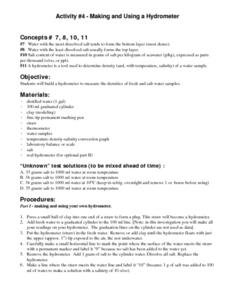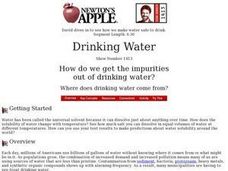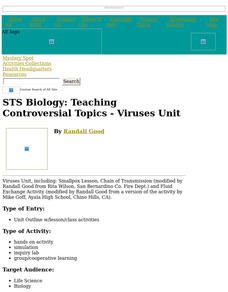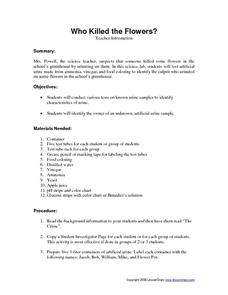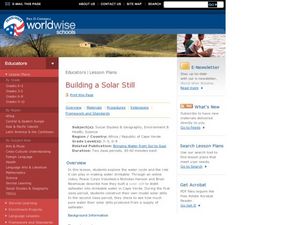Curated OER
Rain Machine (Solar Still)
Students experiment with a solar still. In this distillation lesson plan, students find a simple way to use evaporation to make salty water drinkable.
Curated OER
Rusting and the Scientific Method
Young scholars observe the oil can scene with the tin man from a clip from "The Wizard of Oz" and answer the question, "What can we learn about rust from this scene?". They take 2 tubes and 2 nails, adding 1 salt packet to 2 ml of...
Curated OER
A SALT WATER-Y WORLD
Students observe a model of the distribution of the earth's water and compare the relative volumes and percentages of types of water on earth.
Curated OER
Making and Using a Hydrometer
Pupils build a hydrometer to measure the densities of fresh and salt water samples. They record the water temperature and density and use the temperature, density, and salinity conversion graph to locate the salinity. Finally, students...
Curated OER
Still Waters
Pupils construct a still to turn seawater into drinking water. They estimate the cost of distilling it. They investigate ways to make the conversion more efficient. They track the source of their home drinking water and make a map of its...
Curated OER
It's Too Salty!
Students examine water shortage and the process of changing salt water to fresh water. They examine a world map, define key vocabulary terms, conduct experiments involving seeds and salt water and creating distilled water, and illustrate...
Curated OER
Petroleum Poisons
Students discover how harmful petroleum distillates are that are found in the home. They demonstrate how to collect information about consumer products. They also ask their parents about the safety of the cleaning supplies used in their...
Curated OER
Seltzer Breath
Young scholars investigate "indicator" (Bromothymol Blue or BTB) to test for the presence of certain chemicals in liquids and gases. They compare distilled water and seltzer water for presence of carbon dioxide.
Curated OER
Ground Level Ozone Testing
Students prepare Shoenbein Paper to test the ground level of ozone. They dip a strip of their test paper in distilled water and hang it at a data collection site. They determine the relative humidity of the data collection site. Using a...
Curated OER
Effect of Acid Rain on Plants
Students observe the effects of acid rain on plants through experimentation and research. Students research types of crops in their area. Students work in small groups to complete the experiments given, as well as write a report and...
Curated OER
Testing for Conductivity
Students test the conductivity of selected liquids and solids. They test the circuit by touching the two free ends of the wires together and add salt little by little recording the data after each addition. Finally, students predict...
Curated OER
Periodic Behavior of Oxides
Students investigate the properties of oxides and observe their periodic trends. In this behavior of oxides lesson plan, students experiment with metallic oxides and non-metallic oxides to determine if they are acid, basic or amphoteric...
University of Georgia
What's So Special about Bottled Drinking Water?
Is artesian water designed to be better, or is it just from wells similar to those in the city of Artesium? This experiment looks at many different types of bottled waters, including artesian. Using a soap mixture, scholars test to see...
Curated OER
Viruses
A fliud exchange activity using pipettes/droppers to exchange fluids with at least 3 people. your students are advised not to spill any liquid. Droppers are collected in a large beaker, and students return to desks while holding tubes....
Curated OER
Using Environmental Models to Determine the Effect of Acid Rain on an Ecosystem
Demonstrate to your middle school science learners how chalk breaks down in a weak acid. Discuss what affects acidic rain might have on ecosystems. Lab groups then choose one of two questions: "How does acid precipitation affect an...
Curated OER
Pollution and Environmental Studies- Daily Water Use
In this environmental studies worksheet, students create a data table to discover how much water each person uses on a daily basis and what it is used for. They complete a post activity to make and test solutions for pollution using a...
Curated OER
The Roots of Prohibition: Examining the Effort to Prohibit Alcohol in America
Five segements from Ken Burns' documentary series Prohibition, easily accessed on the PBS website, are at the center of a terrific short unit on the roots of America's ambivalent relationship with alcohol. Engage your secondary class...
NOAA
Importance of Deep-Sea Ecosystems – What Killed the Seeds?
Most drugs used today come from nature, so the discovery of new ecosystems in the deep sea is exciting from a medical perspective. Scholars develop their own bioassay to test germination rates in seeds.
NOAA
Watch the Screen!
Can a sponge cure cancer? Life science pupils visit the drugstore under the sea in the fifth lesson of six. Working groups research the topic then get hands-on experience by testing the inhibiting effects of several plant extracts on E....
Cornell University
Predicting Chemical Reactions
Prove the Law of Conservation of Mass through a lab investigation. A well-designed lesson asks groups to combine materials and monitor indicators for chemical reactions. Measuring the mass of the reactants and products allows individuals...
Curated OER
Solubility Product of a Hydroxide
Students determine the solubility product constant and the concentration of a hydroxide. In this solubility product lesson plan, students use a solution of calcium hydroxide to neutralize a known concentration of hydrochloric acid. They...
Lesson Snips
Who Killed the Flowers?
This could be really good, or it could be really bad! The crime to be solved is, "Who went pee in the flowerpot?" Given four imitation urine samples, young chemists or crime scene investigators perform pH, glucose, and turbidity tests to...
Curated OER
Building A Solar Still
Students investigate the water cycle by viewing an online video. In this drinking water instructional activity, students create solar stills at their campus in order to purify water that is tainted. Students view a video on their...
Curated OER
Make a Solar Sill
Students design a solar still and purify water. For this earth process and design lesson, students observe how the heat of the sun helps to purify water. Students analyze why this could be helpful on a desert island. Students record...
Other popular searches
- Fractional Distillation
- Water Distillation
- Distillation Lab
- Simple Distillation
- Distillation Crude Oil
- Fraction Distillation
- Salt Water Distillation
- Distillation Experiments
- Water Cycle and Distillation
- Fractional Distillation Labs
- Science Distillation
- Petroleum Distillation





